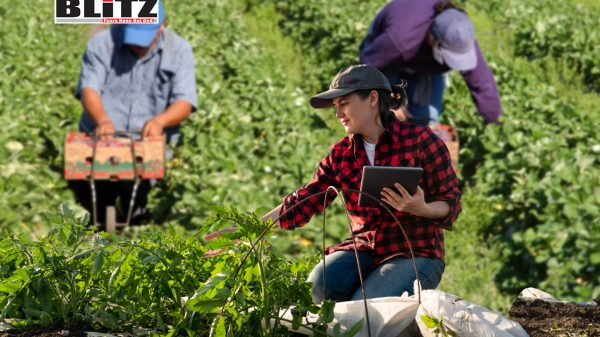Exploited in the fields women migrant farm workers face abuse and insecurity
- Update Time : Tuesday, August 26, 2025

When the United Kingdom government renewed the Seasonal Worker Scheme (SWS) for another five years earlier this year, it was hailed by ministers as a necessary measure to address persistent labour shortages in agriculture. Yet for many of the women who travel thousands of miles to pick Britain’s fruit, vegetables, and flowers, the scheme has become less of an opportunity and more of a gateway into exploitation.
A new briefing published by Focus on Labour Exploitation (FLEX), a charity campaigning to end trafficking and exploitation in the UK, has uncovered troubling evidence of gender-based inequalities within the SWS. The report, titled Uneven Fields: Women Workers’ Experiences of the Seasonal Worker Scheme, provides a sobering account of how migrant women are disproportionately subjected to harassment, economic insecurity, and degrading treatment.
Even before their first shift in the fields, many women are already locked into a cycle of debt. Migrant workers often take out loans to cover the steep upfront costs of participating in the SWS – visa fees, recruitment charges, flights, and associated expenses. According to FLEX’s survey data, 77% of women reported resorting to loans to fund their journey, compared with 70% of men.
For women, this financial burden is compounded by the fact that their promised working hours and wages often do not materialise. The scheme’s guidelines clearly state that workers must be guaranteed the National Living Wage of £12.21 per hour (for those aged 21 and over) and at least 32 hours of paid work per week. Yet 21% of women surveyed reported receiving less than 32 hours, compared with 11% of men.
This shortfall leaves women particularly vulnerable. Many struggle to earn enough to cover their debts, creating conditions that border on debt bondage. With mounting financial pressure and few avenues for redress, they can quickly find themselves trapped in insecurity rather than uplifted by opportunity.
Beyond the numbers, FLEX’s report shines a light on the everyday realities of gender-based discrimination within the agricultural sector. Women workers described being assigned to so-called “easier” indoor jobs that were deemed more suitable for their gender. These tasks, however, were generally lower-paid and offered fewer opportunities for bonuses compared to the more physically demanding outdoor work assigned to men.
On paper, such allocations may appear benign, but in practice they reinforce economic inequality and outdated stereotypes. Employers’ decisions about what women “should” do effectively limit their earning potential and entrench the view that their labour is less valuable. One worker interviewed by FLEX described feeling “like a slave” after being shouted at by supervisors about performance targets, while others highlighted the use of intimidation and power dynamics as methods of control.
This gendered division of labour does more than just short-change women. It cements a hierarchy in which women are systematically pushed to the margins of an already precarious workforce.
The problems do not end when shifts are over. Accommodation provided under the SWS frequently exposes women to further risks, particularly of sexual harassment and violence. Migrant workers are often placed in cramped, mixed-gender caravans where privacy is scarce. In some cases, bathrooms and showers lack locks, and toilets are outdoors in freezing conditions.
Such environments leave women especially vulnerable. FLEX’s report details cases of unwanted sexual attention, harassment, and even threats of assault. In one alarming example, a woman reported facing repeated threats of sexual violence from eight male colleagues. Rather than confronting the perpetrators, her employer simply relocated her, leaving the aggressors free from consequence.
This pattern highlights a systemic failure to address sexual harassment in the workplace. The burden of adapting to unsafe conditions consistently falls on women workers, while those responsible for creating or enabling the hostile environment remain unchallenged.
The Equality Act 2010 places clear obligations on employers to prevent sexual harassment, yet enforcement mechanisms remain weak. The Equality and Human Rights Commission (EHRC), tasked with enforcing the law, lacks the resources and powers to act effectively. Meanwhile, the Health and Safety Executive, which regulates workplace safety in Britain, does not even classify sexual harassment as a safety concern.
As a result, many harassers face no consequences, employers often ignore their legal responsibilities, and migrant women workers continue to pay the price. The fragmented and under-resourced system of labour market enforcement leaves them with little recourse and no guarantee of protection.
The findings of FLEX’s report make one conclusion unavoidable: the Seasonal Worker Scheme, as currently designed, increases the risks of exploitation rather than reducing them. While it may address short-term labour shortages in the agricultural sector, it does so at the expense of basic rights, safety, and dignity for thousands of migrant workers – particularly women.
The UK government has announced its intention to establish a single enforcement body, the Fair Work Agency, to bring together fragmented oversight functions. On paper, this could be an important step forward. But without adequate funding, resources, and a gender-responsive approach, the agency risks becoming yet another ineffective institution.
If the government is serious about tackling exploitation, reforms must go further. Independent monitoring of working conditions and accommodation under the SWS must be strengthened. Clear pathways for workers to report abuse – without fear of retaliation – must be established. Employers who fail to protect their staff must face real consequences. And gender-specific risks must be systematically addressed rather than treated as secondary concerns.
The UK agricultural sector is increasingly reliant on migrant labour, and the Seasonal Worker Scheme is designed to keep the industry afloat. But if the scheme continues to tolerate – or even enable – exploitation, it is unsustainable both ethically and economically. Workers who feel unsafe, undervalued, and financially insecure are less likely to return, leaving farms vulnerable to the very shortages the scheme was created to solve.
Moreover, Britain’s international reputation is at stake. By turning a blind eye to the abuses taking place in its fields, the government risks being seen as complicit in exploitation. The renewal of the SWS for five more years, without meaningful reform, sends a troubling message: that the productivity of farms matters more than the rights of the people who keep them running.
The evidence presented in FLEX’s Uneven Fields report is clear. Women working under the Seasonal Worker Scheme face disproportionate risks of debt bondage, discriminatory job allocation, unsafe accommodation, and sexual harassment. These are not isolated incidents, but systemic issues that require urgent action.
As Britain moves forward with its agricultural labour policies, the government must recognise that migrant women are not just temporary workers filling a gap – they are human beings entitled to dignity, safety, and equality. Anything less than a full overhaul of the scheme will leave the UK complicit in perpetuating a system of exploitation in its fields.










